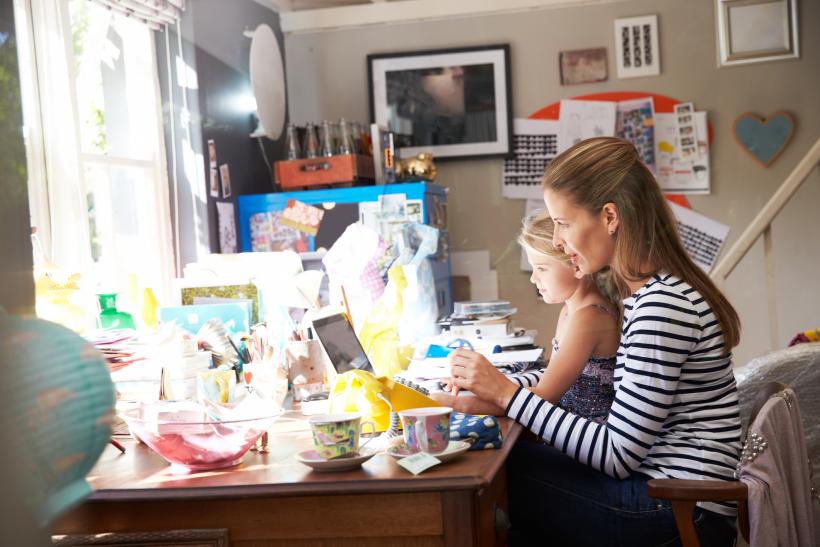
Unfortunately, eating the WAHM cake isn’t always sweet.
Whenever I tell someone I work from home, I typically hear the following responses:
That’s awesome you get to wear your PJ’s all day!
How nice, you have something to keep you busy!
Cool, you can make some extra cash.
I understand people making these comments aren’t trying to be insulting. Truly, I do. They probably see that I’m a mom who saves money on daycare, can attend dance class in the middle of the day with my kid (laptop in tow), and has freeing flexibility. HASHTAG #FAMILYGOALS #HAVINGITALL (Side note: I hate the phrase “having it all” because no one has it all and no one ever will).
Here’s the deal: I don’t wear my pajamas all day.
It may come as a shock, but I do have to leave the house sometimes. I’m not a bored teenager on summer vacation, so I don’t need something to “keep me busy.” And extra cash would be nice, except I’m contributing to my household and supporting my family. That’s called income.
The condescension lobbed at work-at-home moms is subtle and seemingly harmless, but it’s rooted in a reductive stereotype about moms that just won’t quit: women can’t possibly be serious about their work and their children simultaneously. Especially, if the mom is still “at home.”
And maybe they’re right.
Maybe we’re selling our professional selves short by staying right there, where they’ve always wanted us.
At a glance, my life as a woman and work-at-home mother looks like a feminist’s wet dream. I’m college educated with a solid career history filled with escalating job moves and promotions. I’ve had a pretty successful career both as a staff writer and freelancer. I’ve saved thousands on daycare costs (especially when my kids were little). I don’t have to take time off when my kids are home sick. I take conference calls during soccer practices. I still contribute to social security by continuing to work (hope it’s still there when I need it!) There is a bank account with my name on it (not my husband’s). And yes, sometimes, I work in my pajamas.
The work-at-home mom revolution was born out of moms and families looking to find solutions to the ever-growing demands of modern parenting, while keeping a professional identity. It was sparked by a very clear need in corporate America – families needed more flexibility. They needed a change. However, the burden of change fell on the moms and they could only go so far.
The result: work-at-home mom, or WAHM.
The WAHM appears to be the mother of all corporate victories, one that touts the elusive “balance” between motherhood and career. The gender equality win we’ve been fighting for! Brava! Educated women get to have their babies and their jobs. Their minivans and their tenure tracks. Their 401Ks and their families. Their cakes. All the cakes! And eating them proudly with their paychecks.
Unfortunately, eating the WAHM cake isn’t always sweet.
Working from home is often a total shit show. There are days I can’t get a full thought out for hours on end. When my kids are home, I’m constantly interrupted by snack requests, spills, and tantrums. I get sidetracked by laundry and dishes.
These aren’t just daily nuisances or the sucky trade-offs of work-at-home life — these challenges are counterproductive to gaining gender equality for women and mothers in the professional sphere.
“One identified family-related disadvantage that may result from home is that the telecommuter may be expected to shoulder greater household responsibility because that person is ‘home all day,’ a 2015 study in the Association for Psychological Science (APS) found. “Thus, telecommuting on the part of women may reinforce gendered divisions of labor.”
Seriously, when will the divisions budge?
Not soon enough, I think to myself as I glance away from my computer screen and notice a pile of unfolded clothes. Screw you unfolded laundry. Especially those fucking fitted sheets! I’m not alone in my plight.
In 2016, only 19 percent of men did housework — such as cleaning or doing laundry — compared to 49 percent of women, according to the US Bureau of Labor Statistics. Additionally, 68 percent of women did food preparation and/or cleanup compared to 42 percent of men. This doesn’t even include the invisible mental load and emotional labor women are bogged down with daily: keeping track of doctor appointments, hiring out to fix things in the home, playdate schedules, family vacation planning, etc.
To keep up with their larger share of the domestic pie, women who work at home are no doubt feeling the pressure to multitask like a mother. They might fold laundry on a conference call or email their kid’s teacher while on the clock.
If a work-at-home mom is taking five minutes here and five minutes there to manage children or domestic tasks, it adds up. Our productivity is bound to take a plunge. The consequence of not getting women fully out of the home is that we’re still tethered to antiquated traditions and gender roles that keep us from being as professionally valuable as possible. Women are then faced with the reality that their decreased productivity could lead to less opportunities for advancement, and in turn, less money earned over a lifetime.
You Might Also Like: 4 Annoying Things People Say To Work-From-Home Moms
Another drag of the work-at-home mom daily grind, is social and professional isolation. For an introvert like me, I think, I could care less about interacting with humans face-to-face all day. The less humans, the better. However, I know the corporate dance. I used to do it. There is a certain amount of small talk that goes a long way towards staying in good standing with management and securing one’s future. I also know how humans work — we all feed off of some level of engagement and connection with one another. If we didn’t, we wouldn’t live in communities or ever get lonely.
Whether you’re an introvert or extrovert, everyone gains emotionally and professionally from workplace interactions and relationships with colleagues and management.
In the APS study above, telecommuters reported that they missed developmental opportunities by working from home. Some felt stigmatized by their colleagues and like they didn’t “belong.” They also felt left out on key face-to-face moments with managers that could’ve possibly led to promotions and advancement. Again, the hit isn’t necessarily felt in moments of long-lost happy hours, it’s to your pocket.
While skipping office drama (and drinks with co-workers) seems like a trip to Disneyland, one must not forget that the office can be an idea oasis. Your co-workers got their jobs for a reason. Many of them have great ideas and diverse perspectives. Without little side chats in the hallways or water cooler talks, it’s possible that moms who work solely at home miss out on key conversations that could spark their creativity.
Ultimately, moms putting their ideas in a vacuum by working from home could reduce their ability to innovate, which as a result, makes them less valuable to a company. We lose again.
I salute my sisters who got us this far — I’m grateful to be working, earning an income, and taking care of my babies. But my sights are set on something much more expansive and long-lasting. The job isn’t done until the gap is closed for me or my daughters.
I believe through the rose-colored glasses of women’s empowerment, we took scraps. We took second-best.
Under the guise of so-called choice, the work-at-home revolution was celebrated. But it was never about choice for many of us. Many college-educated moms didn’t “opt-out” of their jobs or traditional workplace settings. We were forced to leave our jobs or become work-at-home moms, and even stay-at-home moms, because there were no other viable options.
The work-at-home arrangement puts a Band-Aid on a societal ill affecting women and mothers, but it can’t ever be the solution.
It’s important to recognize that this set up is not a choice for many mothers, it is a trap. A way to shut us up, give us what we want, while still keeping us in the home tending to all of the things we’ve tended to since the dawn of time.
To finish the job, we must get mothers out of the home in equal measure to men. Only then will we garner the professional respect we deserve, the financial freedom we need, and economic power we’ve rightfully earned all along.








